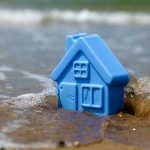Great news? – Spring is around the corner in Ottawa!
This article was updated March 5th, 2019
With warmer temperatures comes blossoming flowers and smiling faces. Though, this is also a time for warranted concern for homeowners. With the winter weather that Ottawa received this year, homeowners should be wary of the coming spring thaw.
The accumulated snow our city received this year has even led Environment Canada’s Senior Climatologist, Dave Phillips, to grant Ottawa the ‘gold medal for winter misery’. We’ve gone through massive amounts of snow fall, freezing rain, ice pellets, along with very cold temperatures. January set Ottawa’s snowiest year on record.
With 50% more snow than we would normally get, we still have plenty of snow in our yards and around our foundations. Spring weather on the forecast is normally great news, but this year homeowners should begin preparing for potential flooding.
The Canadian insurance industry claims that floods have surpassed fires as the top source of insurance claims across the country and these risks are heightened this year.
Spring is fast approaching, with mild temperatures forecasted to begin in the last two weeks of March. If you want a dry basement come spring, it is important that you check your foundation now.
Cracks in your foundation allow this water in, causing further damage to the concrete and can eventually lead to major structural damage or flooding in your basement. It is important to take action to fix cracks, waterproof your foundation, and learn what steps can be taken to avoid basement flooding, in order to save money, damage, and stress.
The first step to understanding when to be worried about damage to your foundation is to understand what causes foundation cracks. Some types, sizes and locations of cracks can be more serious than others, and require more immediate attention.
Foundation cracks are caused by a number of different factors, including snow melt, heavy rain, flooding, poor drainage, drought, earthquakes, and more.
What can you do to avoid a wet basement?
As homeowners there are some simple things that you can do as preventative measures to avoid water coming into your basement. Keep in mind that homes built before the 1970s are more prone to flooding.
- Keep eavestroughs clear so that water does not pour over the side
- Check that your downspout did not become disconnected during the winter
- Extend your downspouts and your sump pump run-off 10 feet from your house
- Make sure your yard is sloped away from your house
- Shovel snow away from your foundation and window wells
- Install a plastic cover above your basement windows
- Plant trees away from your house. The distance away from your house should be at least the mature height of the tree
- Check for cracks and have them assessed before they become a major problem
It is important to have your foundation professionally assessed rather than doing a self-assessment. Professional opinion is backed by years of experience by experts that are familiar with foundations and how the size and type of crack will affect how potentially damaging it may be. When extremely expensive damage is at stake, it is best to defer to the expertise of someone who knows foundations like the back of their hand. The confidence provided by an expert assessment can be the very thing that saves your basement from flooding, or from major damage to the home.
It is difficult to factor in everything that can go into something as complicated as foundational integrity, and that’s what ACS is here to handle in order to put you at ease.
Get in touch with the dependable team at Affordable Concrete Services to get a free quote and prepare you for the ensuing thaw. Save money now and save money in the future by trusting ACS to take care of your foundation.






